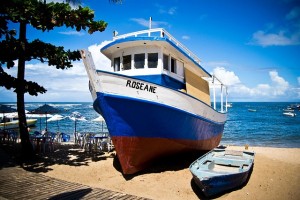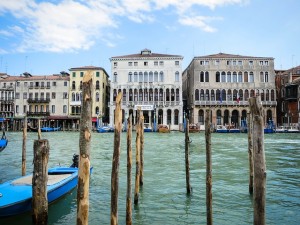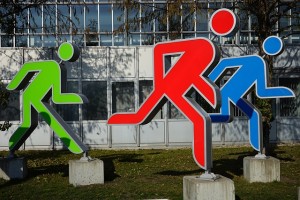boat
[noun]
[de boot, de bo-ten] 
 ‘Boot’ is the general word for ‘boat’. When you are looking for boots to wear, we call them ‘laarzen’. Bigger ships are called ‘schepen’ in Dutch, with singular form ‘schip’. It’s sometimes a bit unclear when a vessel is a ‘boot’ or a ‘schip’, in general smaller vessels are a ‘boot’. I’ve insulted sailors in the past by referring to their ‘schip’ as a ‘boot’.
‘Boot’ is the general word for ‘boat’. When you are looking for boots to wear, we call them ‘laarzen’. Bigger ships are called ‘schepen’ in Dutch, with singular form ‘schip’. It’s sometimes a bit unclear when a vessel is a ‘boot’ or a ‘schip’, in general smaller vessels are a ‘boot’. I’ve insulted sailors in the past by referring to their ‘schip’ as a ‘boot’.
The general verb for ‘to sail’ and ‘to (go) boat(ing)’ in Dutch is ‘varen’. When you are really sailing (i.e. using the wind), we say ‘zeilen’.
Examples:
– “Als je in Amsterdam bent, moet je zeker een keer een tocht maken met een rondvaartboot.”
(“When in Amsterdam, you should really do a canal cruise.” Lit. “make a trip with a round-trip boat.”)
– “Ik zou wel een boot willen hebben, maar een boot moet je onderhouden en daar heb ik geen zin in!”
(“I would like to have a boat, but a boat has to be maintained and I don’t feel like doing that!”)
– “Zo dat is een grote boot!” – “Het is meer een schip dan een boot hoor!” – “O, sorry hoor!”
(“My, that is a big boat!” – “Hey, it’s more of a ship than a boat!” – “Oh, I beg your pardon!”)
– “We gaan op vakantie naar Zuid-Frankrijk en we nemen onze boot mee!” – “Zo, chique chic hoor, maar kunnen jullie dan niet beter gaan varen? (I.p.v. rijden?)”
(“We’re going on holiday to the southern parts of France and we are bringing our boat!” – “My, fan-cy, but hadn’t you better sail? (Instead of driving?)”)
Expressions:
– “De boot afhouden”: to refuse to commit oneself, to keep one’s distance.
– “De boot missen“: to miss the boat.
Example:
– “Een paar jaar geleden leek het erop dat er iets was tussen ons, maar we hebben nu definitief de boot gemist…”
(“A few years ago it seemed there was something going on between us, but by now we have missed the boat for sure.”)
Related words:
– Varen: to sail, to (go) boat(ing) [verb] [voer, gevaren].
– Vaartuig: vessel [noun] [het vaartuig, de vaartuigen].
– Boottocht(je): boat trip/excursion [de (het) boottocht(je), de boottocht(jes)].
– Zeeman: sailor, seaman [noun] [de zeeman, de zeemannen].
– Schip: ship [noun] [het schip, de schepen].
– Stoomboot: steamboat, steamship [noun] [de stoomboot, de stoomboten].
Example:
– “Zie ginds komt de stoomboot uit Spanje weer aan.”
(“Look over there, the steamboat from Spain is arriving.” From a children’s song that welcomes Sinterklaas who traditionally arrives from Spain by steamboat.)
– Veerboot: ferry [noun] [de veerboot, de veerboten]. We also say ‘(het) veer’ or ‘(veer)pont’, the latter for smaller ferries sometimes also referred to as ‘pontje’.
– Bootje: small boat to take for short trips, e.g. on the Amsterdam canals [noun] [het bootje, de bootjes].
– Onderzeeër: submarine [noun] [de onderzeeër, de onderzeeërs]. “Onder zee” means “below sea”.

 The earliest version of this saying is “dat staat als een paal”: it’s as firm as a pole in the ground. The current ‘boven water’ version probably has to do with ‘meerpalen’: mooring posts.
The earliest version of this saying is “dat staat als een paal”: it’s as firm as a pole in the ground. The current ‘boven water’ version probably has to do with ‘meerpalen’: mooring posts. The adjective ‘onbekend’ has two general translations: ‘unknown’ and ‘unfamiliar / unacquainted (with)’. In case of the latter, it is also common to use ‘niet bekend’. The related noun is ‘onbekende’ the meaning of which changes depending on the article: ‘het onbekende’ is ‘the unknown’ and ‘de onbekende’ is ‘the stranger / the unknown person’.
The adjective ‘onbekend’ has two general translations: ‘unknown’ and ‘unfamiliar / unacquainted (with)’. In case of the latter, it is also common to use ‘niet bekend’. The related noun is ‘onbekende’ the meaning of which changes depending on the article: ‘het onbekende’ is ‘the unknown’ and ‘de onbekende’ is ‘the stranger / the unknown person’. A ‘hardloper’ literally translates as ‘somebody who walks fast’; the word is typically used in the context of sports (a ‘runner’ or ‘jogger’). The noun ‘doodloper’ one only encounters in today’s phrase; it’s derived from the verb ‘doodlopen’ which means ‘to lead nowhere, to come to a dead end’. There is also the reflexive verb ‘zich doodlopen’: to walk oneself to death. Both could be applicable here; the phrase ‘hardlopers zijn doodlopers’ says that when you begin too quickly on something, you may not last until the end. It’s also used to say that you shouldn’t rush into things and take your time to do something properly.
A ‘hardloper’ literally translates as ‘somebody who walks fast’; the word is typically used in the context of sports (a ‘runner’ or ‘jogger’). The noun ‘doodloper’ one only encounters in today’s phrase; it’s derived from the verb ‘doodlopen’ which means ‘to lead nowhere, to come to a dead end’. There is also the reflexive verb ‘zich doodlopen’: to walk oneself to death. Both could be applicable here; the phrase ‘hardlopers zijn doodlopers’ says that when you begin too quickly on something, you may not last until the end. It’s also used to say that you shouldn’t rush into things and take your time to do something properly. ‘Pauze’ is the general word for a break or intermission. In sports however, half-time (or interval) is called ‘rust’. In case of the latter, one is actually resting, whereas ‘pauze’ does not necessarily imply that you deserve a rest 🙂
‘Pauze’ is the general word for a break or intermission. In sports however, half-time (or interval) is called ‘rust’. In case of the latter, one is actually resting, whereas ‘pauze’ does not necessarily imply that you deserve a rest 🙂